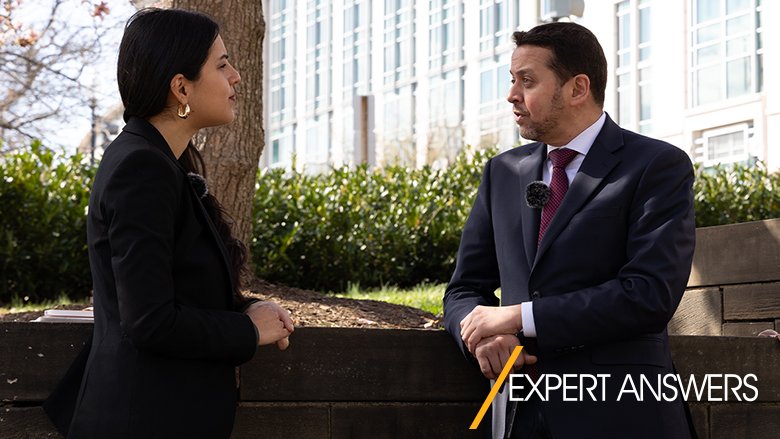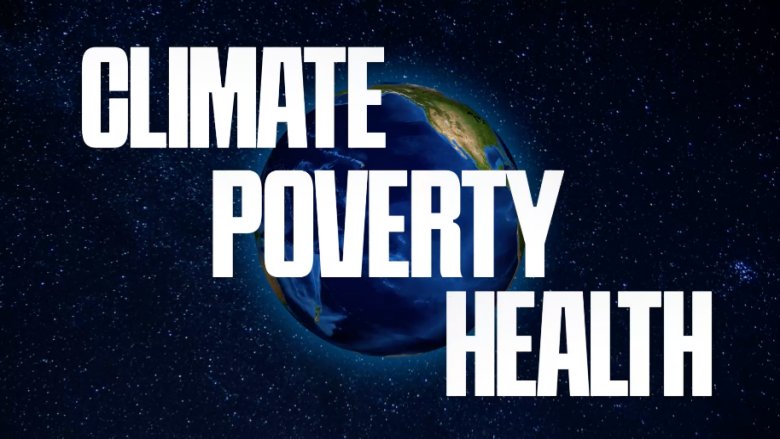It’s no secret that climate change is leading to parts of the world becoming uninhabitable. We know it’s fueling poverty, food insecurity, conflict and the displacement of people. But climate change is also having a devastating impact on people’s health - particularly in the developing world. And as climate change gets worse, the effects on health will also worsen. From an increase in infectious diseases and pandemics, to strains on health systems.
Join us on this episode of Expert Answers as we hear from Tamer Rabie, World Bank Lead Health Specialist. He tells us what the World Bank is doing to tackle the issue and what more needs to be done.
Timestamps
00:00 Welcome
01:12 The effects of climate change on people's health
03:00 Making health systems climate resilient
05:05 Investing in climate resilience
07:35 Why adaptation is so important
08:50 The importance of partnerships
10:13 Closure
Transcript
[00:00] - The decisions that we're making today are affecting generations to come. So it is a joint responsibility, it's a collective responsibility.
- Hello and welcome to another episode of Expert Answers. My name is Andrea Tapia, and we're here in Washington, D.C., surrounded by beautiful cherry blossoms that are hitting peak bloom early this year because of mild weather. This might come as no surprise given 2023 was the hottest year on record. And while some of us enjoy a sunny day, warmer temperatures have been leading to some catastrophic consequences. Across the world, climate change is fueling displacement, conflict, and leading to food security crisis, with developing countries being the most affected. It is also affecting people's health in a dire way, from increased disease to childhood stunting. In this episode of Expert Answers, we look at the link between climate change and health and what can be done to address the issue. So today, I'm delighted to be joined by Tamer Rabie, World Bank Lead Health Specialist. Welcome to Expert Answers.
- Thank you so much.
[01:12] - So Tamer, I'd like to start our conversation today talking about the effects of climate change on people's health. Can you talk about this, in particular as it relates to the most vulnerable communities?
- So perhaps let me start off by saying that the links between climate and health have been established for quite some time. We do know that there's a vicious circle between risks and impacts when it comes to climate. There is an increase in heat-related deaths. There's also an increase in non-communicable diseases, worsening of maternal child health outcomes, alteration of disease pattern transmissions, and even putting a lot of strain on health systems. But also not to forget that, you know, when we talk about the climate crisis, it's not just the direct impacts of the climate crisis on health, but also at the same time the indirect impacts that come through food security, nutrition, access to clean water, sanitation, all of which, obviously, have huge impacts on people's lives and livelihoods, and put a lot of vulnerable populations, including the elderly, women, children, marginalized populations at risk. Based on estimates that we've conducted in the World Bank, we're seeing that nearly 21 million people could lose their lives by 2050 if we continue with business as usual. In addition to that, looking at the broader scheme of things, we're also seeing that nearly 44 million people could be pushed into extreme poverty by 2030. A lot more needs to be done on addressing the climate crisis, and particularly putting people at the heart and at the center of action. The decisions that we're making today are affecting generations to come. So it is a joint responsibility, it's a collective responsibility.
[03:00] - So, you spoke about the effects of climate change on health systems. Can you explain to us why it's important for health systems to become climate resilient, and what is the World Bank doing to support countries in this process?
- We have in the World Bank really adopted a three-pronged approach to this. In the first instance, this is about coming in, our initial goal is to focus on supporting governments in at least 100 countries and assessing these climate and health vulnerabilities that we're, you know, we're talking about. It needs to start off by understanding country context, risks for lives, livelihoods, by using a suite of diagnostics that would get us really to understand the climate-health vulnerabilities, as well as the economic impacts as a result of that. We're putting together a shared investment framework with other development banks that gets us really to think a little bit more about the landscape of investment opportunities for scaling up country tailored solutions. And then a second part is how do we then bring in the finance to go with that? So we're scaling up investments for these country tailored solutions, investing in strengthening health systems, preparedness, capacity for climatic shocks, as one example. Also adapting health service delivery to changing disease patterns. Perhaps climate proofing also health facilities so that they become more, maybe an example here, more flood or heat-resistant. Increasing the capacity of healthcare workers to deal with these changing patterns of diseases, you know, that we're referring to. But at the same time, also not forgetting or not losing sight of the fact that there's also a need to be addressing the crisis itself. So while we're adapting to the climate crisis, it's also extremely important to be moving towards low-carbon systems. So working on energy efficiency, ensuring that we are putting a cap on greenhouse gas emissions, as a part of health sector activity is extremely important in what we do.
[05:05] - So, speaking of investments and climate tailored solutions, what's the importance of investing in climate resilience? And can you talk about some examples of policies that have been effective or projects that you think are worth just expanding on?
- You know, we are the largest investor in health systems across the world. With an active portfolio of nearly $34 billion and nearly 200, well actually, more than 200 projects in over 100 countries, I believe that the World Bank is uniquely positioned to help all our client countries transform health systems in such a way that they become more resilient and more climate responsive. At the World Bank, also, the other thing that we're doing is we are adopting an integrated approach to our health investments, putting climate and health resilience at its core. So with that in mind, I think some few examples to highlight, you know, include what we've done in Madagascar. Madagascar is a country where malnutrition is one of the largest or biggest public health concerns. And communities are now facing an additional impact from climate on health outcomes in the form of nutrition, but also in terms of food security. And through Bank investments, what we've been able to do is we've been able to expand food security through community nutrition sites. That we actually used climate data to target vulnerable populations. More than 3 million children actually benefited from that project. That's one example. If you talk about another example where, you know, we look at a country like Yemen, for example. So in Yemen, the Bank has supported the strengthening of surveillance and early warning systems for climate-sensitive disease outbreaks like cholera. In Nagaland, India, we have supported basically through a project in putting in place off-grid solar panels for health facilities, cutting down on greenhouse gas emissions. So we've done the full range, if you will, of both adaptation and mitigation. But let me be very clear about this. Our main focus has been on adaptation. We believe that adaptation is at the core of what we need to be able to do to address the climate and health crisis. Mitigation is important, but adaptation needs to be where we focus our attention.
[07:35] - And why is that, why is adaptation so important?
- Well, you know, let's be open about this. Most of our client countries are not actually the ones that are contributing, you know, the most to the climate crisis. So obviously, you know, mitigation is good development. Once we start focusing on reducing carbon emissions, it's not just about carbon emissions, but it's about improving quality of care, reducing costs. So to some extent, there are obviously benefits in moving on a mitigation angle. But when it comes to the impacts that we're seeing from the climate crisis on health, there's no question that we need to be able to deal with the lives that we're losing now. We need to be able to put in place systems that can cope with what's to come into the future. So for us, investments really have to be focused in that sense, ensuring that we're saving lives, we're reducing, you know, illness among, you know, populations, particularly vulnerable populations. And we're putting in place systems that are transformative in the sense that they can deal with what's to come in the future if things should remain as is.
[08:50] - So we know what the World Bank is doing. But tell us more about the importance of partnerships in this context.
- I think the scale of the climate crisis shows us that there's not a single organization that can do this alone. In fact, our collective action is needed in this respect. We have established a Development Banks Working Group for Climate and Health Finance in the lead up to COP28, which is a good example of how we've been thinking about partnerships. This was to ensure that we're coming into harmonize on our tools, instruments, financing, to provide for technical assistance to client countries that we all serve. The second example is the work that we've been doing with the Alliance for Transformative Action on Climate and Health, which was born out of COP26. And in the Alliance, the World Bank is co-leading with the government of Germany, the Health Financing working group. Here, we're trying really to push the thinking and the frontier, if you will, on the kind of solutions that we can put forward to client countries, working in tandem with the technical agencies on identifying the best buys for climate and health. Those that would give us the highest rate of returns on investments is an example of how we work together, you know, collectively. So I think in sum, partnerships is core and integral to what we do on the climate and health crisis.
[10:13] - Thanks so much for all these insights and all this information today. Thank you so much for joining us on Expert Answers.
- Thank you so much, Andrea.
- So today, we've heard some startling predictions, but also, some ways forward to address the impact of climate change on health. If you wanna know more about this topic or what the World Bank is doing to address this issue, you can check out our website. Thanks so much for joining me on this edition of Expert Answers. My name is Andrea Tapia, see you next time.


